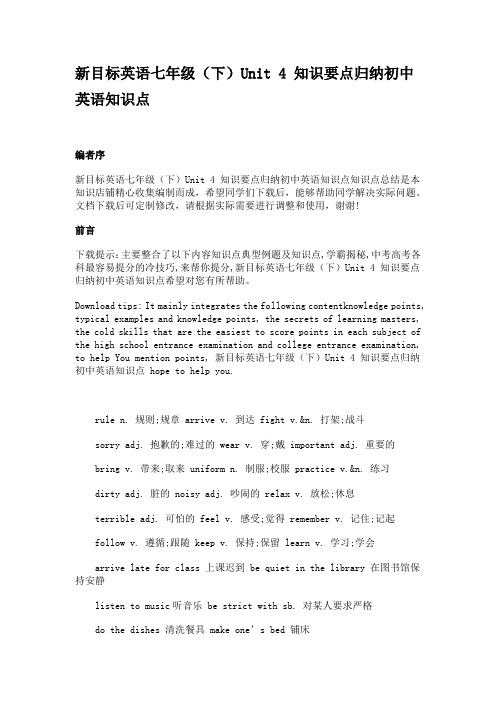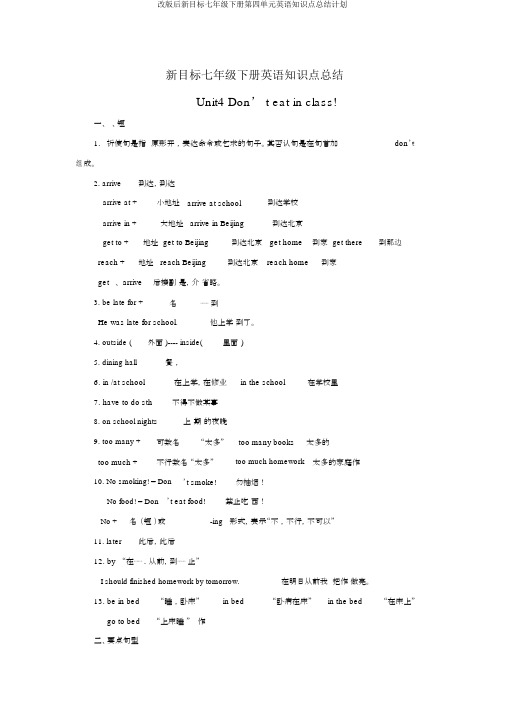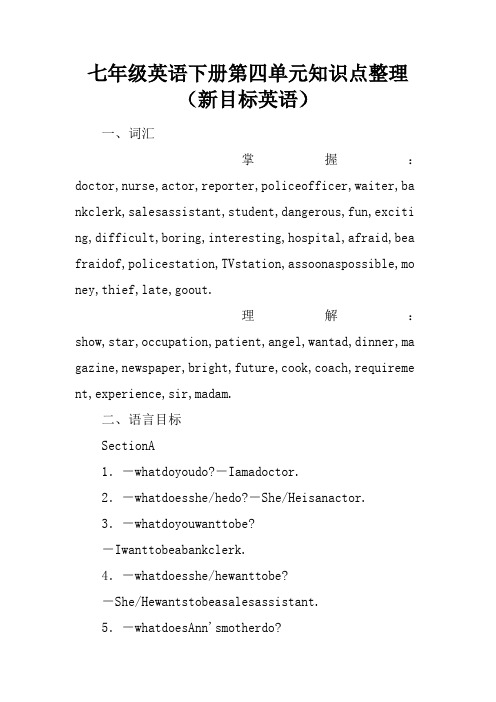改版后新目标七年级下册第四单元英语知识点总结
- 格式:doc
- 大小:24.50 KB
- 文档页数:4

新目标英语七年级(下)Unit 4 知识要点归纳初中英语知识点编者序新目标英语七年级(下)Unit 4 知识要点归纳初中英语知识点知识点总结是本知识店铺精心收集编制而成,希望同学们下载后,能够帮助同学解决实际问题。
文档下载后可定制修改,请根据实际需要进行调整和使用,谢谢!前言下载提示:主要整合了以下内容知识点典型例题及知识点,学霸揭秘,中考高考各科最容易提分的冷技巧,来帮你提分,新目标英语七年级(下)Unit 4 知识要点归纳初中英语知识点希望对您有所帮助。
Download tips: It mainly integrates the following contentknowledge points, typical examples and knowledge points, the secrets of learning masters, the cold skills that are the easiest to score points in each subject of the high school entrance examination and college entrance examination, to help You mention points, 新目标英语七年级(下)Unit 4 知识要点归纳初中英语知识点 hope to help you.rule n. 规则;规章 arrive v. 到达 fight v.&n. 打架;战斗sorry adj. 抱歉的;难过的 wear v. 穿;戴 important adj. 重要的bring v. 带来;取来 uniform n. 制服;校服 practice v.&n. 练习dirty adj. 脏的 noisy adj. 吵闹的 relax v. 放松;休息terrible adj. 可怕的 feel v. 感受;觉得 remember v. 记住;记起follow v. 遵循;跟随 keep v. 保持;保留 learn v. 学习;学会arrive late for class 上课迟到 be quiet in the library 在图书馆保持安静listen to music听音乐 be strict with sb. 对某人要求严格do the dishes 清洗餐具make one’s bed 铺床follow the rules 遵守规则 wear a uniform 穿校服Don’t arrive late for class. 上课别迟到。

新目标七年级下册英语知识点总结Unit4 Don’ t eat in class!一、、短1.祈使句是指原形开,表达命令或乞求的句子。
其否认句是在句首加don’t 组成。
2. arrive到达,到达arrive at +小地址arrive at school到达学校arrive in +大地址arrive in Beijing到达北京get to +地址get to Beijing到达北京get home到家get there到那边reach +地址reach Beijing到达北京reach home到家get、arrive后接副是,介省略。
3. be late for +名⋯⋯到He was late for school.他上学到了。
4. outside (外面 )---- inside(里面)5. dining hall餐,6. in /at school在上学,在修业in the school在学校里7. have to do sth不得不做某事8. on school nights上期的夜晚9. too many +可数名“太多”too many books太多的too much +不行数名“太多”too much homework太多的家庭作10. No smoking! = Don’t smoke!勿抽烟!No food! = Don’t eat food!禁止吃西!No +名(短)或-ing形式,表示“不,不行,不可以”11. later此后,此后12.by “在⋯⋯ . 从前,到⋯⋯止”I should finished homework by tomorrow.在明日从前我把作做完。
13. be in bed“睡,卧床”in bed“卧病在床”in the bed“在床上”go to bed“上床睡” 作二、要点句型’t arrive late for school=Don’t be late for school’t fight’t listen to music in the classroom.’t run in the’t smoke .It’s bad for your health.’t play cards in’t talk in’t watch TV on school nights.’t sleep in play sports in the classrooms.’t sing songs at talk when you eat. ’twear hats in homework by 10:00.your house! the bed.we ⋯⋯ ? Yes ,we can . No, we can’: Can we arrive late for class ?No, we can ’t. We can ’t arrive late for class.you have to wash your clothes? Yes, I do./No, I don’t.三、要点句子1.Don ’t arrive late for . Don’t run in the . Don’t eat in the classrooms.4.Do n’t listen to music in the classrooms or the . Don’t fight.6.What are the rules?7. Can we listen to music?8.Do you have to wear a uniform at school?9. What else do you have to do ?10.Don ’t go out on school . Practice your guitar every day .12.I have too many rules in my family.13.I can ’t meet my friends after school because I have to do my homeworkl14.I have to be in bed by ten O’. I have to help my Mom make dinner.ter , I have to go to the Children’s Palace to learn the piano.17.I never have any fun, what can I do?四、重点精析祈使句往常用来表示命令、求、禁止、建、警示等气。

七年级英语下册第四单元知识点整理(新目标英语)一、词汇掌握:doctor,nurse,actor,reporter,policeofficer,waiter,ba nkclerk,salesassistant,student,dangerous,fun,exciti ng,difficult,boring,interesting,hospital,afraid,bea fraidof,policestation,TVstation,assoonaspossible,mo ney,thief,late,goout.理解:show,star,occupation,patient,angel,wantad,dinner,ma gazine,newspaper,bright,future,cook,coach,requireme nt,experience,sir,madam.二、语言目标SectionA1.-whatdoyoudo?-Iamadoctor.2.-whatdoesshe/hedo?-She/Heisanactor.3.-whatdoyouwanttobe?-Iwanttobeabankclerk.4.-whatdoesshe/hewanttobe?-She/Hewantstobeasalesassistant.5.-whatdoesAnn'smotherdo?-Sheisanurse.-whatdoesshewanttobe?-Shewantstobeapoliceofficer.6.-wheredoesyoursisterwork?-Sheworksatahospital.7.myworkisinterestingbutkindofdangerous.Thievesarc afraidofme.SectionB1.Iwanttobeanactor,becauseit'saninterestingjob.2.Doyouwanttoworkhard/late?3.Heisapoliceofficer.It'sanexcitingjob.三、语言结构1.what,where引导的特殊疑问句。

七年级下册英语第四单元知识点一、单元词汇1. 形容词- beautiful /ˈbjuːtɪfl/ 漂亮的- interesting /ˈɪntrəstɪŋ/ 有趣的- delicious /dɪˈlɪʃəs/ 美味的- relaxing /rɪˈlæksɪŋ/ 轻松的- exciting /ɪkˈsaɪtɪŋ/ 激动人心的- boring /ˈbɔːrɪŋ/ 无聊的- difficult /ˈdɪfɪkəlt/ 困难的- easy /ˈiːzi/ 容易的2. 动词- enjoy /ɪnˈdʒɔɪ/ 喜欢- finish /ˈfɪnɪʃ/ 完成- start /ˈstɑːrt/ 开始- stop /stɑːp/ 停止- remember /rɪˈmembər/ 记得3. 短语- have fun 玩得开心- look forward to 期待- be good at 擅长- be interested in 对...感兴趣- try one's best 尽某人最大的努力二、语法点1. 一般现在时- 描述习惯性动作或状态。
- 例句:She always finishes her homework before dinner.2. 一般过去时- 描述过去发生的动作或状态。
- 例句:They visited the museum last Saturday.3. 可数名词与不可数名词- 可数名词可以用单数或复数形式,有计数功能。
- 不可数名词通常没有复数形式,不能直接计数。
- 例句:Water is an uncountable noun, but you can say‘waters’ when referring to different bodies of water like lakes or seas.4. 情态动词 can 和 could- can 表示能力或许可。
- could 是 can 的过去式,表示过去的能力或许可。

七年级下英语4单元知识点七年级下英语的第四个单元主要是关于“时间”的学习。
除了具体的时间表达方式之外,还包括时间的表达方法,以及与时间相关的其他重要单词和短语。
一、时间的表达方式1.用数字表达时间1)正点:在小时数后加上“o’clock”。
例如:It’s three o’clock in the afternoon.(现在是下午三点钟。
)2)半点:在小时数后加上“half”。
例如:It’s half past two.(现在是下午两点半。
)3)四分之一小时:在小时数后加上“a quarter”。
例如:It’s a quarter past four.(现在是下午四点一刻。
)2.用英语单词表达时间英语中有一些特定的表达方式,如下:1)上午:in the morning2)中午:at noon3)下午:in the afternoon / in the evening4)晚上:at night3.用时间段表达时间有时候我们需要表达一段时间内的活动。
这时可以使用以下表达方式:1)从…到…:from…to…例如:I usually get up at six o’clock from Monday to Friday.(我通常从周一到周五都在六点钟起床。
)2)持续多久:last for…例如:The movie lasts for two hours.(这部电影持续两个小时。
)二、与时间相关的其他重要单词和短语除了上述时间表达方式之外,还有许多单词和短语与时间有关,如下:1.日期:date例如:Today is May 1st.(今天是五月一日。
)2.星期:week例如:What day is it today? It’s Wednesday.(今天是星期几?星期三。
)3.月份:month例如:My birthday is in June.(我的生日是在六月。
)4.季节:season例如:My favorite season is summer.(我最喜欢的季节是夏天。

七年级下英语u4知识点总结本文将对七年级下英语 unit 4 的知识点进行总结,以便同学们加深对该单元内容的理解和掌握。
下面将分为听说读写四个方面进行总结,具体内容如下:听:1.学习新的音素该单元学习了“th”音及其发音规则,以及“j”、“ch”、“sh”音的区别及发音方法。
2.练习数词和序数词的发音在此单元,应掌握 1-100 的数词与序数词的读音,并能正确地念出每个数字。
3.听懂简单的对话和短文通过听取老师和同学口语练习,以及对听力材料的反复听取,掌握基本的听力技巧和理解力,能够听懂简单的对话和短文。
4.认识一些问候语和日常用语学习并练习一些日常生活中常用的问候语和常见的日常用语,加强口语交流能力。
说:1.学习并熟练运用新的单词和句型通过老师的讲解以及同学们之间的口语练习,掌握并熟练运用新的单词和句型,提高口语表达能力。
2.模仿对话和短文,并尝试自己编写通过模仿对话和短文,锤炼语感和发音,加深对英语语音、语法和表达的理解,在此基础上尝试自己编写对话和短文。
3.参与角色扮演在教师指导下进行角色扮演练习,增强口语表达能力,同时培养同学之间的合作意识。
读:1.攻克生词通过看图说词、认读游戏等多种方式,学习新的生词以及固定搭配,掌握基本的阅读技能,并在理解生词的基础上进行更深入的学习和掌握。
2.阅读短文和文章,提高阅读速度和理解能力通过阅读短文和文章,提高阅读速度和理解能力,加深对语法和语言结构的理解,增强对整个单元内容的掌握。
3.学习并观察句型的结构注意观察句子结构,理解语法的表达方式,提高对英语语法的把握和应用能力。
写:1.练习书写字母和单词通过反复练习,掌握英文字母和单词的书写,保证书写的清晰和规范。
2.摸索英语书写的语法在教师的指导下学习并摸索英语书写的语法和表达方式,逐渐提升自己的写作水平。
3.尝试写作短文和文章通过课堂练习和作业,尝试写作短文和文章,提升应用英语语言的能力,并在其中体现听、说和读方面的知识点。
七年级下册英4单元知识点七年级下册英语4单元知识点第一部分:语法知识点1.一般现在时一般现在时是描述普遍事实或习惯的时态,其基本形式为主语加动词原形。
例如:I go to school every day.(我每天都去上学。
)2.现在进行时现在进行时描述正在进行的动作或状态,其基本形式为主语加be动词和现在分词。
例如:She is watching TV now.(她现在正在看电视。
)3.一般过去时一般过去时描述已经发生过的事情,其基本形式为主语加动词的过去式。
例如:I saw a movie yesterday.(我昨天看了一部电影。
)4.过去进行时过去进行时描述过去某个时间正在进行的动作或状态,其基本形式为主语加was/were动词和现在分词。
例如:He was reading a book at 7 o'clock last night.(昨晚七点他正在看书。
)5.一般将来时一般将来时描述将来要发生的动作或状态,其基本形式为will/shall加动词原形。
例如:I will visit my grandparents next weekend.(我下周末会去拜访我的祖父母。
)第二部分:词汇知识点1. 常用动词短语常用的动词短语有很多,如come over(过来)、go on(继续)、look up(查找)等。
例如:He is looking up the word in the dictionary.(他正在字典中查找单词。
)2.日常用语日常用语是与生活密切相关的常用词汇,如hello(你好)、goodbye(再见)、thank you(谢谢)等。
例如:Hello, how are you?(你好,你怎么样?)3.常用形容词常用形容词描述事物的性质或状态,如beautiful(美丽的)、interesting(有趣的)、difficult(困难的)等。
例如:It is a beautiful flower.(这是一朵美丽的花。
七年级下module4知识点Module4是七年级下册英语课程的一个重要模块,包括了基础语法知识和实用交流技能。
掌握这些知识点不仅有助于学生在英语考试中取得好成绩,也能够提高英语交流能力。
以下是Module4的重要知识点。
一、一般现在时一般现在时是英语语法中最基础的时态之一。
它是表示现在或经常发生的动作或状态的时态,以动词原形为主要形式。
学生需要逐渐掌握一般现在时肯定句、否定句和疑问句的句型构成和正确使用方法。
例句:1. I usually walk to school.2. She doesn't like coffee.3. Do you play soccer?二、频率副词频率副词用于表达动作或状态发生的频率,通常放在动词之前。
常见的频率副词有always、often、sometimes、rarely、never等。
例句:1. I always eat breakfast before school.2. They rarely watch TV in the afternoon.3. He never forgets his keys.三、第三人称单数第三人称单数是指在句子中主语为第三人称单数时,谓语动词需要加上“-s”或“-es”。
例如,主语为he、she、it时,谓语动词要加“-s”或“-es”。
例句:1. She goes to school by bus.2. His father teaches English at a university.3. The cat likes to play with toys.四、祈使句祈使句是表示命令、请求、建议、劝告等含义的句子。
通常不包括主语,动词原形即可构成祈使句。
例句:1. Please close the door.2. Be careful when you cross the street.3. Let's eat lunch together.五、情态动词情态动词是表示说话人对某种动作或状态的态度、可能性、必要性、推测等含义的动词。
七年级下四单元英语知识点英语是一门重要的语言,而且在现代社会中具有不可置疑的地位。
为了助力广大的小学生更好地掌握英语基础知识,特别为大家整理了七年级下四个单元的英语知识点,希望大家可以认真阅读,掌握其中的重点内容。
一、第四单元:My day1. 词汇:morning, breakfast, get up, take a shower, brush teeth, comb hair, put on clothes, go to school, arrivenoon, have lunch, take a napafternoon, do homework, play sports, watch TVevening, have dinner, take a bath, read a book, go to bed2. 语法:(1)行为动词的一般现在时态主语+行为动词的原形例如:I go to school at seven every morning.(2)日常活动调查疑问句疑问词+一般现在时+主语+行为动词?例如:What time do you get up every morning?(3)词组:get up, take a shower, brush teeth, comb hair, put on clothes, go to school, have lunch, take a nap, do homework, play sports, watch TV, have dinner, take a bath, read a book, go to bed二、第五单元:My school life1. 词汇:school life, form, classmate, teacher, subject, lesson, science, math, English, history, geography, art, music, PE, schoolbag, homework, exam, test2. 语法:(1)一般现在时态的特殊疑问句疑问词+do/does+主语+动词原形+其他?例如:What do you usually do after school?(2)there be句型肯定句:There is a computer in the classroom.否定句:There isn't a computer in the classroom.疑问句:Is there a computer in the classroom?(3)名词所有格名词所有格表示所属关系,通常在名词的后面加上"s"例如:My father's car is in the garage.三、第六单元:I'm more outgoing than my sister.1. 词汇:character, outgoing, shy, tall, short, thin, fat, strong, weak, fast, slow, better, worse, than2. 语法:(1)形容词比较级的用法形容词原形+er例如:tall-taller,fast-faster(2)形容词最高级的用法形容词最高级+in/of+人或物例如:the tallest boy in the class(3)比较级句式主语+动词原形+形容词比较级+than+被比较的人或物例如:Tom is taller than Mike.(4)名词+be+形容词+名词所有格例如:My sister is more outgoing than I am.四、第七单元:My family1. 词汇:family, father, mother, parent, sister, brother, aunt, uncle, cousin, grandparents, granddaughter, grandson, children, son, daughter, husband, wife, marry, family tree, cousin, kitchen, living room, bedroom, bathroom2. 语法:(1)情态动词can的用法can+动词原形例如:I can play the guitar.(2)情态动词should的用法should+动词原形例如:You should do your homework every day.(3)一般过去时态的用法主语+动词过去式例如:I went camping with my family last week.(4)词组:have breakfast/lunch/dinner, like/hate, be from, have a great time, take a nap, do housework, have a shower以上就是七年级下四单元的英语知识点,希望大家好好掌握,学好英语。
七年级英语下册module4知识点模块四是七年级英语下册的一个重要学习模块。
本文将重点介绍module4的知识点,包括词汇、语法、阅读理解和写作技巧等方面。
一、词汇1. 常用动词常见的动词有look, think, want, have, feel, like, love, hate等。
这些动词多用于表达人们的心理活动和意愿。
例如:I often look at the clouds in the sky.(我经常看天上的云彩。
)We want to go to the beach.(我们想去沙滩。
)2. 形容词/副词module4中涉及到的形容词和副词有happy, sad, busy, lazy, fast, slow, hard, easy等。
这些词汇用于描述人或事物的状态或特点。
例如:She is always happy.(她总是很快乐。
)The test was easy.(这次考试很容易。
)3. 数词数词主要用于表达数量。
module4中常见的数词有one, two, three, five, ten等。
例如:I have three pens.(我有三支钢笔。
)Tom has five books.(汤姆有五本书。
)4. 其他常用词汇module4中还包括一些其他常用的词汇,例如: school, teacher, student, lesson, classroom等。
这些词汇在日常生活中经常使用。
例如:The teacher is giving a lesson in the classroom.(老师正在教室里上课。
)二、基础语法1. 时态英语中有多种时态,包括一般现在时、一般过去时、过去进行时、将来时等。
七年级module4主要涉及到的时态有一般现在时和一般过去时。
例如:I go to school every day.(我每天去上学。
)(一般现在时)She watched TV last night.(她昨晚看电视了。
新目标七年级下册英语知识点总结Unit4 Don’t eat in class!一、词组、短语1. 祈使句是指动词原形开头,表达命令或祈求的句子。
其否定句是在句首加don’t构成。
2. arrive 到达,抵达arrive at + 小地点arrive at school 到达学校arrive in + 大地点arrive in Beijing 到达北京get to + 地点get to Beijing 到达北京get home 到家get there 到那儿reach + 地点reach Beijing 到达北京reach home 到家get、arrive后接副词是,介词省略。
3. be late for + 名词……迟到He was late for school. 他上学迟到了。
4. outside (外面)---- inside(里面)5. dining hall 餐厅,饭厅6. in /at school 在上学,在求学in the school 在学校里7. have to do sth不得不做某事8. on school nights 上课期间的晚上9. too many + 可数名词“太多” too many books 太多的书too much + 不可数名词“太多” too much homework 太多的家庭作业10. No smoking! = Don’t smoke! 请勿吸烟!No food! = Don’t eat food! 禁止吃东西!No + 名词(短语)或动词-ing形式,表示“不许,不可,不能”11. later 后来,以后12. by “在…….以前,到……为止”I should finished homework by tomorrow.在明天之前我应该把作业做完。
13. be in bed “睡觉,卧床”in bed “卧病在床”in the bed “在床上”go to bed “上床睡觉”强调动作二、重点句型1.Don’t arrive late for school=Don’t be late for school2.Don’t fight3.Don’t listen to music in the c lassroom.4.Don’t run in the hallways5.Don’t smoke .It’s bad for your health.6.Don’t play cards in school7.Don’t talk in class8.Don’t watch TV on school nights.9.Don’t sleep in class.10.Don’t play sports in the classrooms.11.Don’t sing songs at night.12.Don’t talk when you eat.13.Don’t wear hats in class.14.Do homework by 10:00.15.Clean your house!16.Make the bed.17.Can we ……? Yes ,we can . No, we can’t.Eg: Can we arrive late for class ?No, we can’t. We can’t arrive late for class.18.Do y ou have to wash your clothes? Yes, I do./No, I don’t.三、重点句子1. Don’t arrive late for class.2. Don’t run in the hallways.3. Don’t eat in the classrooms.4. Don’t listen to music in the classrooms or the hallways.5. Don’t fight.6. What are the rules?7. Can we listen to music?8. Do you have to wear a uniform at school?9. What else do you have to do ?10. Don’t go out on school night.11. Practice your guitar every day .12. I have too many rules in my family.13. I can’t meet my friends after school beca use I have to do my homeworkl14. I have to be in bed by ten O’clock.15. I have to help my Mom make dinner.16. Later , I have to go to the Children’s Palace to learn the piano.17. I never have any fun, what can I do?四、重难点精析祈使句通常用来表示命令、请求、禁止、建议、警告等语气。
它的主语you(听话人)通常省略。
其构成通常有以下几种形式。
1)Be型(即系动词原型be+表语+其他)。
如:Be quiet,please.否定句Don’t + be+表语+其他。
如:Don’t be angry.2)Do型(即系动词原形+宾语+其他)。
如:Open you books,please.否定句Don’t +实义动词原形+宾语+其他。
如:Don’t eat in the classroom.3)Let型(即Let+宾语+动词原形+其他)如:Let me help you. Let’s go at six o’clock.否定句一般在宾语后加not。
如:Let’ not watch TV.4)No+V-ing型(此种形式通常用于公共场合的提示语中,意为“禁止做某事“)如:No smoking! 严禁吸烟!No talking! 不许交谈!No passing! 禁止通行!No parking! 不许停车重难点解析:1. 情态动词have to 的用法,意思是"必须、不得不",它侧重于客观上的必要和外界的权威。
(1)结构:主语+have to+动词原形+其他(一般现在时,主语是第三人称单数时,用has to;句子是过去时,用had to.)如:We have to wear sneakers for gym class. 在体育课上,我们必须穿运动鞋。
Tom has to practice the guitar every day. 汤姆每天必须练习弹吉它。
I had to get up at 5:00 am last Monday. 上周一,我不得不早上5点起床。
(2)否定形式:主语+don't have to+动词原形+其他(一般现在时,主语是第三人称单数时,用doesn't have to. 句子是过去时,用didn't have to)如:Nick doesn't have to wear a uniform. 尼克不必穿制服。
We didn't have to do our homework at once. 我们不必马上完成作业。
(3)疑问句:Do (Does或Did)+主语+have to +动词原形+其他如:Do you have to stay at home on weekends? 周末你必须呆在家里吗?Yes, I do. / No, I don't.是的,我必须.不,我不必。
Did he have to go to bed by 11:00 last night? 昨晚,他不得不11点前上床睡觉吗?2. 情态动词can的用法(1)表示能力,"会""能"(在第一册中已经学习这种用法)Can you play the guitar? 你会弹吉它吗?Judy can speak a little Chinese. 朱蒂会说一点中文。
I can dance and sing. 我能唱歌又能跳舞。
(2)表示允许、许可,"可以"、"能"(在这一课中新学的词义)Can the students run in the hallways? 学生们可以在走廊上跑吗?We can eat outside. 我们可以在外面吃东西。
Can I come in? 我能进来吗?注意:同样是情态动词,can 和have to 的用法是有区别的,和大部分情态动词一样,can在否定句中,直接在can后加上not,在疑问句中,把can放到主语前面,并且没有人称和数的变化。
3. hear,listen和sound都有"听"的意思,但三者是有区别的。
(1)hear"听说",侧重于"听"的内容I'm sorry to hear that you are ill. 听说你生病了,我很难过。
I never heard such an interesting story. 我从来没听过这么有趣的一个故事。
(2)listen"听"侧重于"听"这一动作。
Listen to me carefully. 认真听我说。
The children like to listen to music. 孩子们喜欢听音乐。
(3)sound"听起来",它是系动词,后面接形容词等。
That sounds great. 那听起来真不错。
It sounds like fun. 听起来挺有趣。
4. be in bed "在床上、卧床"in 和bed之间不能用冠词,bed也不用复数。
He is in bed for 10 years. 他卧床10年了。
Dave has to be in bed early every night.大卫每晚必须很早睡觉。
5.arrive late for 与be late for 意思相近"迟到"Don't arrive (be)late for school. 上学别迟到。
I arrived (was)late for the meeting yesterday. 我昨天开会迟到了。